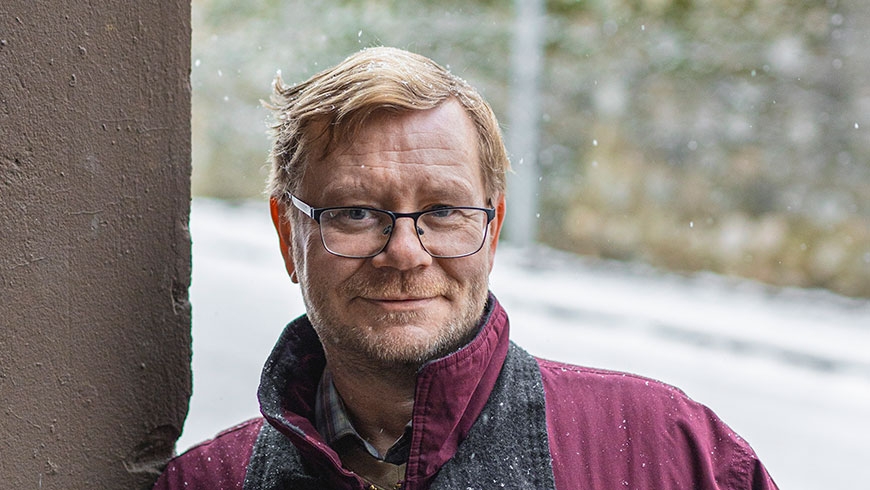
From a single guy to a foster father of five – family care allows a child to grow up in a family
Petri Hartikainen became a foster parent through a series of fortuitous events. Familar’s family care services have provided enormous support for him as a foster parent.
“Absolutely not!” was the first thought of Petri Hartikainen from Siilinjärvi when he was asked to become a foster parent in 2012.
While he had previously acted as a support person, Hartikainen considered it an impossible thought that he, a single man working in three shifts, could be a foster father. Instead, he became a support person for a young boy.
- We met the following Wednesday and went out to eat. On Friday night, he was at my door and told me he’d spend the weekend with me. After just one month, school was over and he again appeared on my doorstep and informed me that he’d come live with me, says Hartikainen.
Becoming a foster parent through a series of fortuitous events
When Hartikainen was asked to act as a support person for a child in 2000, the 27-year-old young man had no idea what he was getting into. He found support family training to help him clarify his role as a support person. Soon, he was asked to act as a support person for other children and young people.
Hartikainen took his first step to becoming a foster parent in 2010, when he promised to act as a holiday substitute for his support child’s foster home. He passed the required coaching programme so that he could act as a foster family substitute in the future as well, but he did not consider becoming a foster father himself. This changed when he became a foster father for a 16-year-old boy after the end of the programme.
- It totally overturned my life, but I haven’t regretted it for a single day! Hartikainen laughs.
Since 2012, Hartikainen’s family has included a total of five children, and he is now a full-time foster father. Child welfare service provider Familar has been a great support in foster parenting. Familar’s employees know the children’s needs and also have personal experience of foster and support family activities, which enables them to provide valuable peer support.
Different children need different families
According to social worker Minna Jauhiainen from Familar, family care is always the preferred option in child welfare compared to institutional care, as long as the family can fulfil the child’s needs.
- The advantage of family care is that it gives the foster child the opportunity to grow up with a family in a home-like environment and develop long-term and permanent attachments, explains Jauhiainen.
Foster families have a commission agreement with the municipality, but Familar is responsible for the entire process from pre-placement coaching to providing support during placement. Like Petri, many family care providers are at home full time, while others have a part-time or full-time job. Some foster families have two parents, some only have one. Jauhiainen sees the diversity of the families as a strength.
- The children and their needs are very different, so we also need different types of families.
The aim is to build an open and trusting relationship between Familar and the foster family, with regular contacts. When problems arise in daily life, it is easy for the family to ask for help and support. Familar supports foster parents through work counselling and regular discussions with a counsellor, social worker, social psychologist or other professional. The Famile coaching programme for family care providers continues throughout the placement until it ends in the child returning home or becoming independent.
Not even the Father of the Year is always perfect
Last Father’s Day, Hartikainen was honoured with the Father of the Year recognition for his work as a foster father. Through his own example, he has advanced independent foster parenting by men and broken traditional preconceptions about families and being a father. The recognition and accompanying congratulations and comments have felt good.
- I hope I’ve been able to encourage some men into thinking that foster parenting isn’t just for women. Children and young people need both a female and male perspective in their lives, says Hartikainen.
In the daily life of a foster family, however, medals have little value. The days are spent as in any family with a 12-year-old son, taking care of school and planning for the future. Hartikainen wants to raise children to be independent so that they can cope on their own after turning eighteen.
- Sometimes, if I’m about to lose my temper, I stop to think whether this is how the Father of the Year would act. No one’s perfect! Hartikainen adds.
Hartikainen has already guided some of his foster children into adulthood and they have moved into their own homes. The oldest son, who lives further away, visits Hartikainen and his relatives practically every month. The second-oldest son is a familiar visitor almost on a weekly basis.
- He also drops by to borrow some tool or another and uses his own keys. I guess this is still a second home to him, says Hartikainen.
The best thing in daily life is the smile of a child, says Hartikainen: when the child is content and cheerful, he knows he has succeeded as a parent. Jauhiainen agrees.
- When a child is cheerful and also expresses other feelings, even anger, you can see and sense that the child is happy, says Jauhiainen.